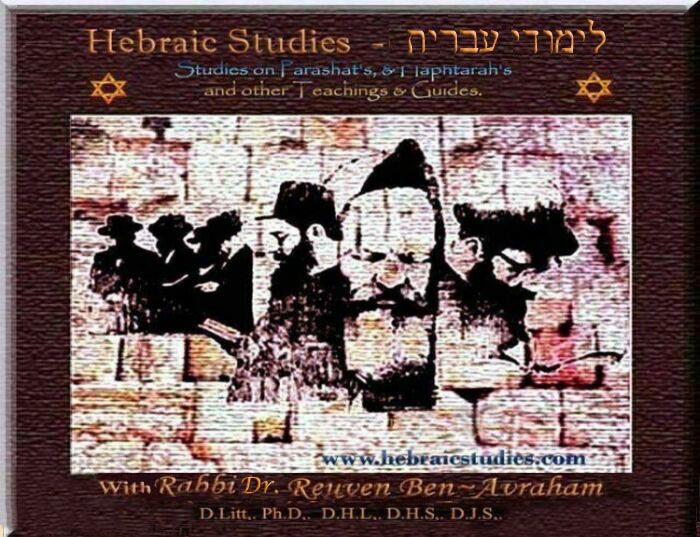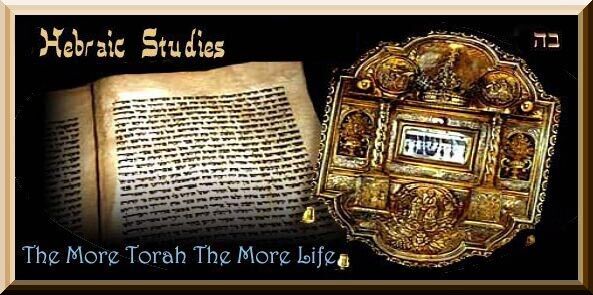The second line with the “Shema Yisroel”
Please Note: Firefox and
some other search engines are not suitable
Use Google Chrome for this page to load perfectly!

Doctorates are as follows:
1. of Literature, 2. of Philosophy, 3. of Hebrew Literature/Letters.
4. of Hebrew Studies. 5. of Hebrew (Jewish) Studies.
Please do NOT visit this site on Shabbat or on a
![]() - Y-H-V-H, blessed be
His Sanctified Name, which we usually pronounce as “Adonai” or “HaShem”
prior the destruction of the Second Temple.
- Y-H-V-H, blessed be
His Sanctified Name, which we usually pronounce as “Adonai” or “HaShem”
prior the destruction of the Second Temple.
Throughout the site I will use a
version based on the “Jewish Publication Society” (JPS)
version of the Torah/Tanakh (Torah - Law/Nevi’im -Prophets/Ketuvim Writtings).
Please Note: Some verse numbers may vary in some version’s of non Jewish Bibles.
*“This is My
Name forever, and this is My memorial to all
generations.” Shemot - Exodus 3:15. (JPS version of the
Torah).
Please Note: Verse numbers may at times vary in non-Jewish Bibles.
“Why
do we have a second Line below the …

I was asked
some time back, per email the above question in RED,
by a faithful Hebraic young man in from a Synagogue I visited in the
1980’s in
“Dear Rabbi Reuven Ben-Avraham, we do
miss you so much, when re you returning to
Short Reply:
“Mein
guter Freund Noan, und an
all die wunderbaren Mitglieder
in deiner Schule, (My good friend Noan,
and to all the wonderful members at your Shul). I certainly remember having such a wonderful time when I spent a
short time with you all! Although it was a too short a time (two days with you)
with you all, I just wish it could have been so much longer! But it was
certainly such a wonderful time with an enthusiastic group of young and older
Yidden who wish to stay close to the origins of our original faith as it was
before the destruction of the second temple when it was so much more that
special and so much more Torah based!
But let me start with the “Smema
Yisroel”
A. The line reads,
“Baruch shem k’vod malchuto l’olam va’ed” – “Blessed be the name of His glorious kingdom for ever and ever”. (From the Siddur).
Unlike the Shema itself, Baruch Shem is a liturgical response used in the
Originally the verse was simply Baruch shem k’vodo
l’olam, “Blessed be His glorious
Name” Tehillim - Psalm 72:19 Based on the “Jewish Publication
Society” (JPS) version of the Ketuvim-Writings).
But then later the rabbis decided to add more to the Shema, for they just found it was just not enough, and they had to add new countless laws above the 613 we have in the Torah, for Elohim’s Words, Blessed Be He, just meant nothing to them, no wonder He cursed them!
“You shall not add to the word which
I command you, nor take from it, that you may keep the commandments
of ![]() your Elohim which I command you”.
Davarim - Deuteronomy 4:2-3. (JPS version of the Torah).
your Elohim which I command you”.
Davarim - Deuteronomy 4:2-3. (JPS version of the Torah).
![]() your Elohim, Blessed be His Sanctified Name, did
mean ONLY HIS 613 mitzvoth!
your Elohim, Blessed be His Sanctified Name, did
mean ONLY HIS 613 mitzvoth!
“Whatever I command you, be
careful to observe it; you shall not add to it nor take away from it”.
Davarim - Deuteronomy 12:32. (JPS version of the Torah).
Rabbis simply cannot help it they love to add and add, just look at our massive prayer cycle that we have now, it is certainly that I do not love to pray, but they have made it out of control!
Obviously the second line is entirely another rabbinic addition, for they just cannot help it this second verse they decided is to be recited silently during congregational worship (except on Yom Kippur, when it is recited aloud).
Whilst in Reform and Conservative Judaism, it is recited aloud, but in a quieter voice than the rest of the prayer. It was originally a liturgical response in use in the Temple when the Name of Name of Elohim, blessed be He, was pronounced and took the form of “Baruch shem k’vod l’olam” - "Blessed be his glorious name forever" (Tehillim - Psalm 72:19).
However, in time the words “malchuto” ("His kingdom") and “va’ed” (“for ever and ever”) were added later. “Malchuto” was
introduced by the rabbis during Roman rule. “Va’ed was
introduced at the time of the
Throughout the year Baruch Shem is said softly, probably because it is non-Biblical and less sacred than the Shema itself. On Yom Kippur, we recall the solemnity with which the people responded when the high priest uttered the ineffable name of Elohim. This historical association explains why Baruch Shem receives such once-yearly emphasis.
Another story relates that Moshe heard the
angels say Baruch
Shem in heaven and he taught it to
Generally we recite it in a whisper, because we are conscious of our mortal frailty; on Yom Kippur we are cleansed from sin, emulate the purity of the angels, and echo the angelic words aloud. However, our spirituality usually does not survive Yom Kippur and we are fallible human beings again with the old vices and lapses.
But of course the rabbis of that time simply
could not leave it at that, for After the Second Temple had been destroyed,
they had already changed our faith to a new name, it was then called
“Rabbinic Judaism”, today we are just called Jews, after Judah, But
what about the other 11 Tribes, they are still with us, I have absolute proof
of that in my Studies.. The Midrash states that Ya’aqov - Jacob (also called ![]() is our Elohim, the one
is our Elohim, the one ![]() !”
!”
In relief Jacob exclaimed Baruch Shem – “Thank Elohim! Blessed be His glorious name for ever!”
The legend has its point for today, when the
Beit Yisroel in some people burns so feebly that one fears their faith is
weakening, until on Yom Kippur there is a grand manifestation of faith and like
Ya’aqov - Jacob we are impelled
to exclaim, Baruch YHVH Elohim! –
“Thank ![]() Elohim”, blessed be His Sanctified Name!
Elohim”, blessed be His Sanctified Name!

![]() Elohim, blessed be His Sanctified
Name, is the One who gave us our Life!”
Elohim, blessed be His Sanctified
Name, is the One who gave us our Life!”

The
Shema Yisroel as it should be!
![]()

Although I have
been with Seanic.net, my hosting server for countless years recently they suddenly
transferred my account
to another server owned by
them without giving me any notification
and only advised me after the event. Even though I have tried to update
whatever they told me, but it proved to be useless, especially in my current
health situation. Even my computer expert said their details simply made no
sense and neither they nor another company I had sought out previously was
unable. Thus sadly you
will have to copy and paste the email address above
into the address box on your email for it to reach me and it will. - Toda Raba, Rabbi Reuven.
Although the Rabbi does not believe in having to copyright any of the studies, but there have been occasions where parts
of the studies have been partially copied and quoted out of context under his name, and thus he has been misquoted by
those who have their own agenda and reasons for doing so. Thus, it is only for this reason these works
are covered under © copyright
restrictions.
